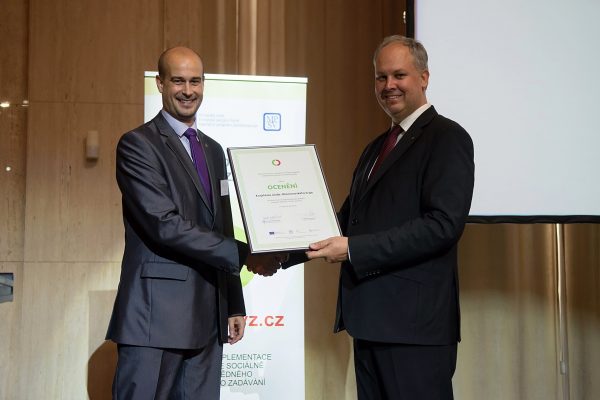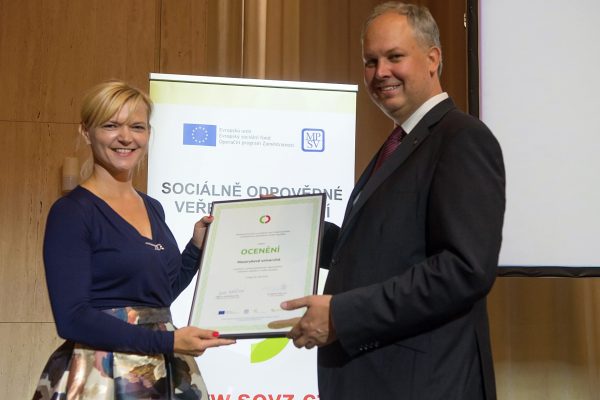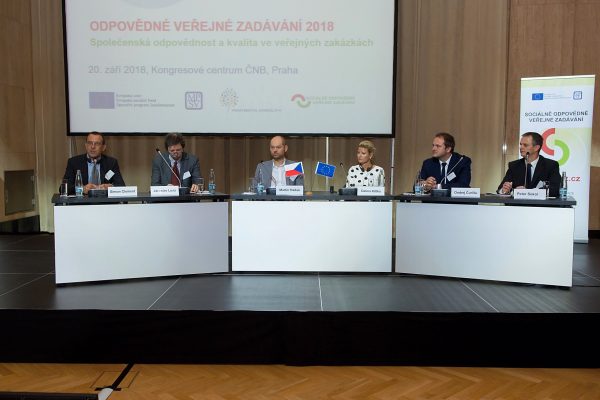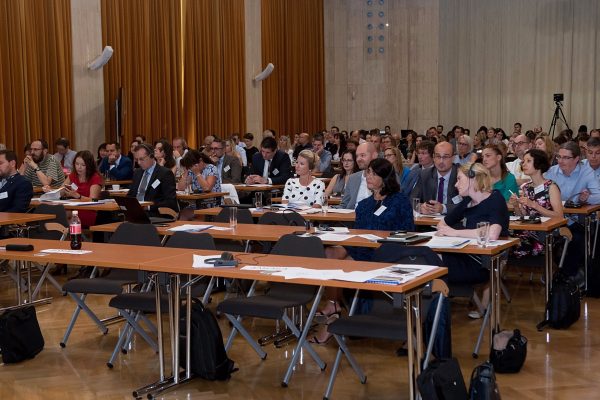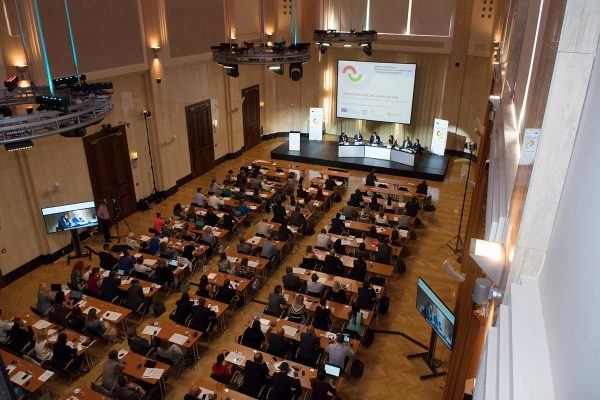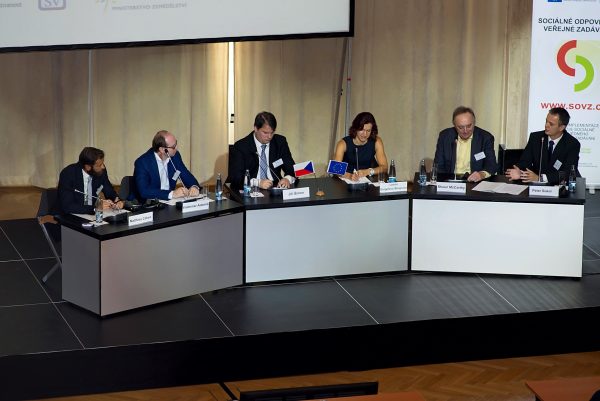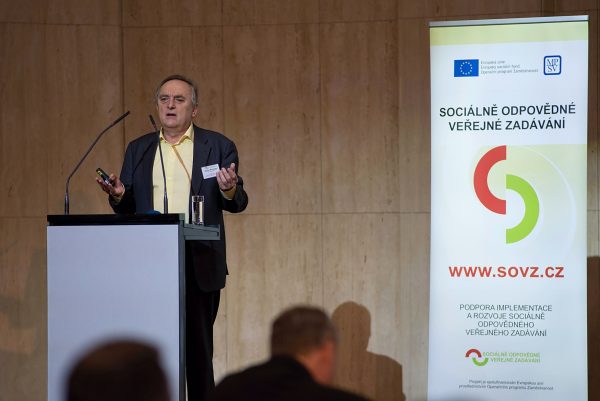2018 Conference on Responsible Public Procurement
2018 Conference on Responsible Public Procurement
by The Ministry of Labour and Social Affairs and the Ministry of Agriculture
SOCIAL RESPONSIBILITY AND QUALITY IN PUBLIC PROCUREMENT
On 20 September 2018, two hundred participants witnessed an interesting discussion at the Czech National Bank’s Congress Centre, and we believe that most of them have taken inspiration and courage to use socially responsible principles in public procurement.
A video from the conference can be watched at YouTube:
Photo:
Presentation:
Keynote – Sustainable Procurement ISO 20400, Shaun McCarthy (Action Sustainability)
Program:
Topic I: Public procurement quality begins with process setup and organisation management
The purchasing power of public contracting authorities is a powerful tool that may be used to influence the market, put pressure on a higher degree of sustainability, and attain other effects with positive impact on the society as a whole. In addition to the specifically defined, socially beneficial objectives, a well-set-up purchasing systems helps improve public purchasing overall.
A number of examples from both Western and Central Europe, the Czech Republic included, testify that a good setup allows contracting authorities to think through their purchasing system, emphasise strategy, interconnect individual purchase phases, maintain overall control of the process, practise good communication with third parties, and optimize the use of their previous experience.
The system approach to the public procurement setup is described in directive ISO 20400:2017. Many aspects are also covered by guidelines published by the Czech Ministry of Finance. These documents, like experience shared by foreign contracting authorities in discussions, may provide answers to the following questions:
- How can a quality internal purchasing system be set up within an organisation and what role does social responsibility play?
- Where does the purchasing process of a public institution begin and where does it end?
- Who are the stakeholders in public purchasing quality management?
- How should processes be managed between individual organisational units to achieve good performance by contractors?
Speakers:
Shaun McCarthy – Action Sustainability (Great Britain)
Valdemar Adamiš – Ministry of Finance (Czech Republic)
Jiří Šimon – Ministry of Agriculture (Czech Republic)
Matthieu Cahen – OECD (France)
Leona Gergelová Šteigrová – Ministry of Labour and Social Affairs (Czech Republic)
Topic II: Quality vs Price. What is the value of social responsibility?
During purchasing, contracting authorities naturally seek the lowest bid price. They should, however, try to find the best price/quality ratio while taking added social value into account. At the very least, contracting authorities should strive to avoid a negative impact on the social and environmental spheres, and wherever possible—without increasing the budget—should support the positive effects of any public procurement contract awarded. An exklusive focus on the lowest bid price is not beneficial, nor does it guarantee quality. Quality assessment is closely related to setting up and allocating weights to individual criteria, seeking the optimum ratio between evaluation criteria, allocating a specific number of points to individual bids, and self-assessment. Discussion of quality vs bid price should answer the following questions:
- How can you define and evaluate the quality of performance of a public contract in the context of sustainability, and who may take part in the definition of quality?
- Percentage-wise, what would constitute too little or too great a focus on quality?
- How can you justify your focus on quality? Can we afford quality or do we have to seek the cheapest solution?
- How to purchase for optimum results as opposed to seeking the cheapest price?
- What are the costs and risks of purchasing cheap solutions?
Speakers:
Martin Hadaš – Masaryk University Brno (Czech Republic)
Simon Clement – ICLEI, (Germany)
Dalma Kittka – City of Budapest (Hungary)
Jaroslav Lexa – Office for Public Procurement (Slovak Republic)
Ondrej Čurilla – HAVEL & PARTNERS s.r.o., attorneys-at-law (Czech Republic)
Topic III: What is the relationship between quality and a sustainable supply chain?
The supply chain, i.e., a system of entities that stand between the raw material and the end customer, may be rather complex for some contracts. If contracting authorities wish to ensure that the performance of public procurement contracts paid for by public funds takes place under fair conditions—timely payments, legal employment, decent work conditions, and protection of the environment—they must consider the risk of failure to maintain such standards within their supply chain. Subcontractors’ social responsibility, i.e., fair payments among businesses, decent work conditions for employees, protection of the environment, etc.—may, as a result, impact the quality of the material performance as such.
Among other issues to be considered is the reputation of public institutions and their responsibility for public procurement impact. The distance between a specific manufacturing process and the contracting authority may not serve as an alibi in considering sustainability. The following questions related to supply chain quality and responsibility will be discussed:
- Why should contracting authorities be interested in supply chains?
- Where does a contracting authority’s responsibility for the context and impact of its purchasing begin and where does it end? What about the risk to its reputation?
- How can supplier relationships and general terms and conditions within the supply chain be reflected in the performance of public procurement?
- How can tools for management of the supplier relationship help guarantee (improved) performance quality?
- How deep should you ‘dig’? To what level in the supply chain should contracting authorities be interested in the conditions under which products are manufactured?
- Can contracting authorities guarantee sound management of resources and respect for human rights by the appropriate setup of their supply chains?
Speakers:
Shaun McCarthy – Action Sustainability (Great Britain)
Caitlin Helfrich – International Labour Organisation, ILO (Switzerland)
Malika Kessous – Ministere de l’Économie et des Finances (France)
Luboš Záveský – State Labour Inspection Office (Czech Republic)
Jiří Prokš – University of Chemistry and Technology, Prague (Czech Republic)


